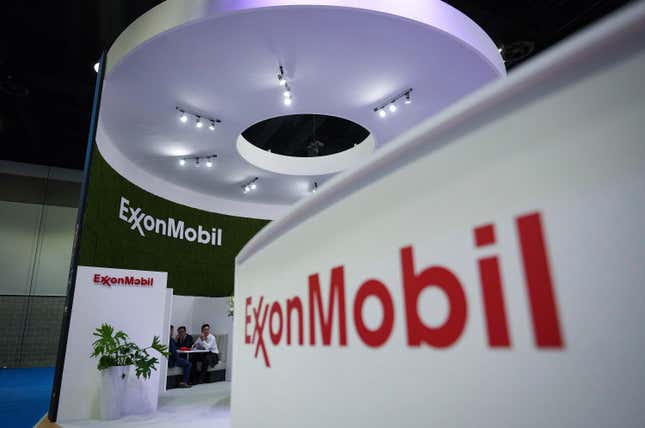
Exxon Mobil's profit declined in its first quarter as natural gas prices fell and industry refining margins dropped.
The energy company earned $8.22 billion, or $2.06 per share, for the three months ended March 31. A year earlier it earned $11.43 billion, or $2.79 per share.
The results didn't meet Wall Street expectations, but Exxon does not adjust its reported results based on one-time events such as assets sales. Analysts polled by Zacks Investment Research were expecting earnings of $2.19 per share.
Shares declined slightly before the market open on Friday.
The Spring, Texas-based company's revenue totaled $83.08 billion, down from $86.56 billion a year earlier. Wall Street forecast revenue of $86.6 billion.
Production in Guyana reached more than 600,000 oil-equivalent barrels per day, a higher-than-expected level, the company said.
Exxon went on a bit of a shopping spree last year when oil prices were surging.
In July, the company said it would pay $4.9 billion for Denbury Resources, an oil and gas producer that has entered the business of capturing and storing carbon and stands to benefit from changes in U.S. climate policy.
In October Exxon topped that deal by announcing that it would buy shale operator Pioneer Natural Resources for $60 billion. Two months later, the Federal Trade Commission, which enforces federal antitrust law, asked for additional information from the companies about the proposed deal. The request is a step the agency takes when reviewing whether a merger could be anticompetitive under U.S. law. Pioneer disclosed the request in a filing in January.
Elevated levels of cash for all big producers drove a massive consolidation in the energy sector. In October Chevron said it would buy Hess Corp. for $53 billion.
Oil markets are being stretched by cutbacks in oil production from Saudi Arabia and Russia, and the war between Israel and Hamas still potentially runs the risk of igniting a broader conflict in the Middle East. While attacks on Israel do not disrupt global oil supply, according to an analysis by the U.S Energy Information Administration, “they raise the potential for oil supply disruptions and higher oil prices.”
Elsewhere in the sector, Chevron Corp. reported a first-quarter profit of $5.5 billion, or $2.97 per share. Its adjusted profit was $2.93 per share.
The results surpassed Wall Street expectations, but Chevron also does not adjust its reported results based on one-time events such as asset sales. Analysts surveyed by Zacks predicted earnings of $2.84 per share.
The oil company posted revenue of $48.72 billion, which fell short of Wall Street's estimate of $49.94 billion.
Chevron's stock dipped in premarket trading.